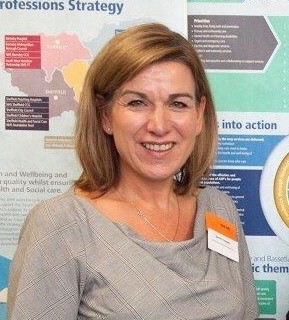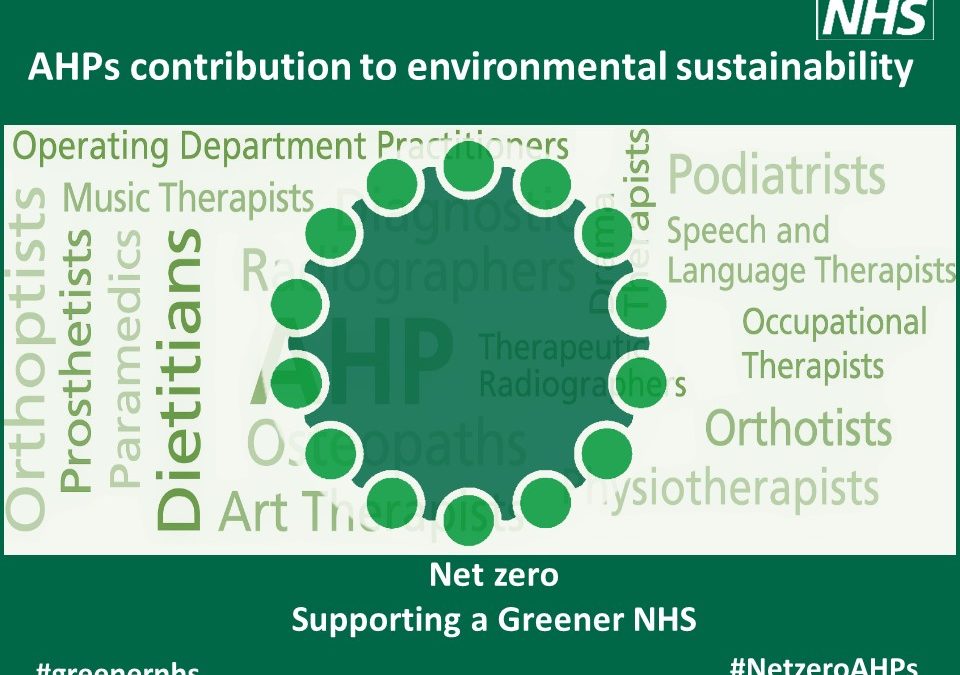In January 2020 Sir Simon Stevens the chief executive of NHS England and Improvement detailed a commitment to a Greener National Health Service (NHS). The NHS is the largest employer in Britain and is responsible for approximately 4% of the carbon emissions of the nation.
On 1st October 2020 Delivering a ‘ Net zero’ National Health Service was published. This report details an ambition to reduce the emissions directly controlled by the NHS by 80% by 2036 to 2039 with the NHS achieving Net Zero carbon emissions by 2040.
Some may argue that a time when the world is facing a global health emergency, through COVID-19, now is not the time to focus on environmental sustainability of health care. However, we know that the impact of Coronavirus has been influenced by social, economic and health concerns. With greater impact being seen in those who have long term conditions such as heart disease and asthma which could be attributed to poor environmental health.
Allied health professionals (AHPs) have a significant role to play in this agenda, which is why the Chief Allied professions officer for England Suzanne Rastrick, has commissioned a piece of work to highlight how AHPs can support environmental sustainability.
A survey was launched in June 2020 to understand the work AHPs are doing already to support this agenda both in response to the COVID-19 pandemic but also to identify potential long-term changes. The survey closed on 31st July 2020, having received almost 900 responses.
The survey identified that as clinicians working in the NHS, many were finding it hard to maintain their values and actions in relation to environmental sustainability as they began their working day. Challenges of access to recycling facilities and the ability to move to paper free or light services were cited along with frustration about the amount of packaging that accompanied items such as walking equipment. Within the survey many respondents detailed the role of prevention and self-management as important components to environmentally sustainable health care.
We identified 5 key themes as areas of focus
- Environmental sustainability literacy
- Food and Diet
- Use of equipment
- Public health, prevention and health promotion
- Digitally enabled care

Sarah Cooper
Clinical Advisor , Office of the Chief Allied Health Professions Officer NHS England and Improvement
Sarah Cooper joined the Office of the Chief Allied Health Professions Officer in NHS England as a Clinical fellow in 2018 undertaking this role until May 2020 since which time she has working as a Clinical advisor a number of work streams associated with delivering AHPs into Action nationally.
Sarah qualified as a Physiotherapist from Sheffield Hallam university in 1995. She specialised in older peoples and neurological rehabilitation following which she has worked in a range of AHP leadership roles and as a Clinical strategy and transformation lead in a provider Trust.
Through this work I have connected with Filip Maric and Ken Chance-Larsen from the Environmental Physiotherapy Association (EPA) who are both supporting the development of the environmental sustainability literacy narrative on these work streams and their insights have been invaluable requirements.
In looking at the use of equipment, including mobility and activity of daily living equipment, we really want to embrace a personalised approach to equipment provision. The NHS net zero plan details an ambition to reuse 40% of mobility equipment, however we believe that through this approach we can reduce the amount of equipment issued whilst maintaining patient safety, only recommending equipment to patients that will be used by them. There are also examples of practice where physiotherapists have stopped issuing items such as theraband and suggested alternatives readily available in the home. We have also identified examples of practice where clinical protocols have been changed to reduce the amount of equipment provided, such as in the total hip replacement pathway, but would be very keen to hear of any further examples of practice change in this area.
The food and diet workstream, will build on the One Blue Dot sustainable diet project developed by the British Dietetic Association. This work will look at how AHPs can contribute to this agenda through having a cohesive approach to nutrition, minimising food waste and looking at personal choices in relation to food and diet.
COVID-19 has seen a significant increase in the use of digital within care pathways. This is a real opportunity for a clinically reasoned approach to embedding this form of intervention, ensuring patients only have to travel for a physical assessment when absolutely necessary or when issues within access to digital would widen health inequalities.
Surprisingly, survey responses had limited reference to the importance of evidence-based effective care in this agenda. Have we as physiotherapists along with the other AHPs overlooked the vital role we have in reducing length of stay and the need for ongoing care through increasing independence and enabling people to return to work and hobbies? Or the contribution we make providing interventions that can eliminate the need for surgical interventions, all of which play a significant part in this agenda?
Our ambition is to create an AHP response to the recently published report, which highlights our key role in environmental sustainability, reminds AHPs of the significant role they are already playing and supports AHPs to further contribute to delivering a net zero NHS.


I am so glad that the environment (planet) and human health is increasingly being linked and talked about. We must all see the interconnected relationship between planet, human and animal health. Thank you for sharing.